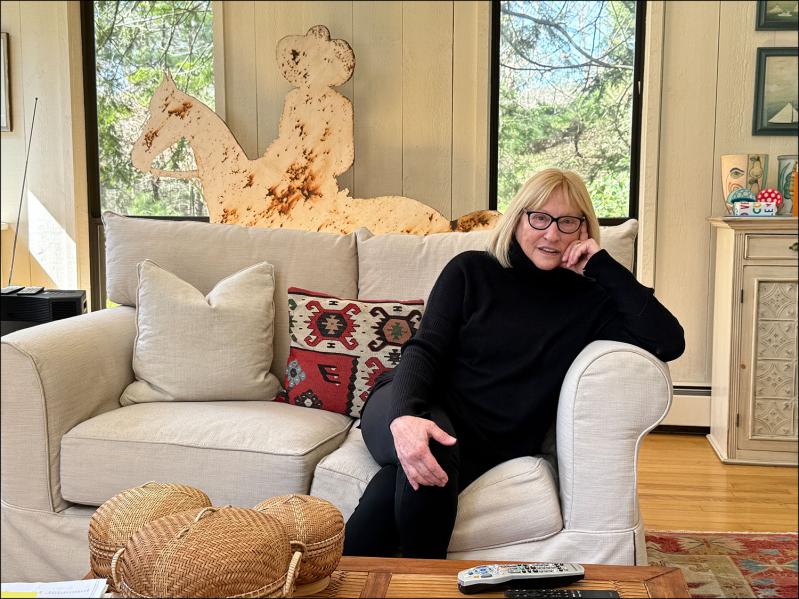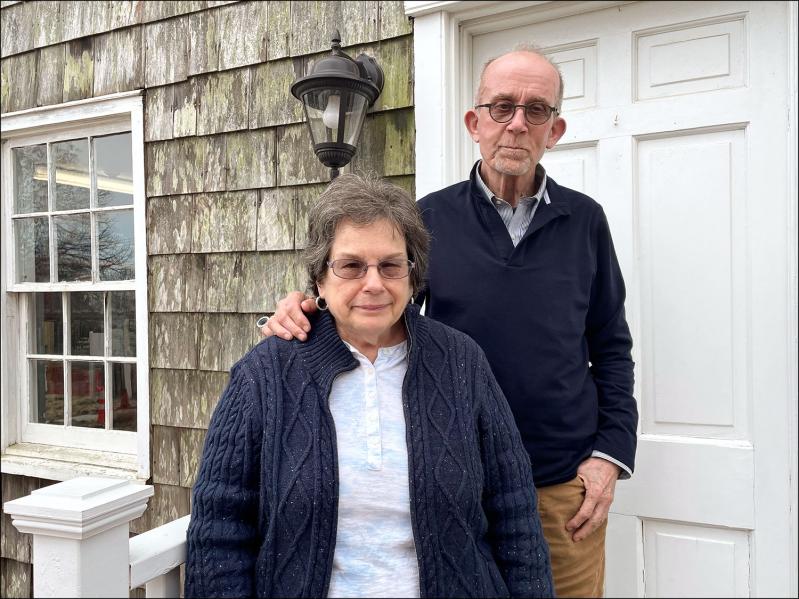Elaine Kenzer-Kollegger is not a joiner. So when a friend invited her to a meeting of caregivers for those with dementia, held each month at the East Hampton Library, she demurred. “I’m not much of a group girl,” she told him. Her husband has Parkinson’s disease and related dementia and now lives at the Westhampton Care Center.
But her friend, Karel De Boer, was persistent, urging her to at least give it a try.
“So I tried it, and I never looked back,” she said.
Ms. Kenzer-Kollegger, a retired teacher, is one of thousands of people on Long Island looking after someone with Alzheimer’s disease or another form of dementia. The role can be emotionally and physically taxing as caregivers work to keep their loved ones cared for and safe. It can also be lonely. But support groups like the one Ms. Kenzer-Kollegger attends, run by the Alzheimer’s Association, are providing a place for caregivers to share tips and frustrations, air their sadness, and know that they are not alone.
The group meets at 11 a.m. on the second Tuesday of every month in the Bendheim Room at the East Hampton Library. It is co-facilitated by Karel De Boer, whom Ms. Kenzer-Kollegger met when her husband and his partner, Bill, were roommates at the Westhampton Care Center. Bill had Alzheimer’s for several years and died at the end of 2023.
Mr. De Boer was part of the support group himself for three years when Bill was sick and he was looking after him. The other caregivers brought him camaraderie and comfort, and helped keep him going as Bill’s health declined. Last year he received training from the Alzheimer’s Association to become a meeting facilitator himself. Each month brings somewhere between 10 and 12 attendees, he said, and lasts about an hour and a half.
“It was one of the most difficult but yet also the most rewarding things I’ve ever done,” Mr. De Boer said of looking after Bill. Sometimes the difficulties outweigh the rewards. That’s where the support group comes in. But it’s not just a place to talk through problems.
Ms. Kenzer-Kollegger describes the meetings as “chock-full of information . . . and small victories” that caregivers share with one another, such as ways to get a reluctant partner to shower or how to take the car keys away from someone with dementia who can no longer safely drive.
Being a caregiver of someone with dementia brings up a host of complicated feelings, including anger (“I smashed some plates,” said Mr. De Boer), feelings of abandonment, and guilt. He said all these feelings are welcomed at the meetings, and nothing that is said in the meetings goes outside the room. He emphasized, “It is not a professional therapy session. It is a discussion group” where everyone gets a turn to speak.
“What we are doing is just giving the caregivers a chance to vent and be themselves, and not have to put a brave smile on their face,” he said.

When Linda Child first attended one of the meetings about a year ago, she wasn’t sure she’d be back. “It was scary,” she said, hearing about things other caregivers were going through that she had not yet experienced. Ms. Child’s husband has Alzheimer’s and is still able to do a lot for himself. But it is a progressive disease, and she knows a time will come when more will be required of her. But although she felt like fleeing, she showed up again the following month because she figured she had something to learn. She’s now a regular.
“I have found it to be very, very informative and eye-opening,” she said. “The things they tell you — all the people who have been there — you’re getting their knowledge, and that’s not a bad thing.”
She said there is no pressure to share if you just want to sit and listen.
Some attendees, including Ms. Child, feel monthly meetings are not enough for those grappling with the challenges of caregiving. She and Ms. Kenzer-Kollegger are now part of a second group for those who are veterans of the first.
According to the Alzheimer’s Association’s Long Island chapter, 12 percent of Long Islanders over the age of 65 have Alzheimer’s disease. The association runs support groups for caregivers of those with Alzheimer’s and other types of dementia all over the Island, but the one in East Hampton is right now the only in-person group on the South Fork. There are others in Mattituck and Riverhead, and several virtual support groups that caregivers can attend over Zoom. More information can be found at alz.org/longisland.
“Some people can’t leave their loved ones at home to attend a support group. That’s where the virtual groups fill that void,” said Lori Maldavir, director of program outreach with the Alzheimer’s Association’s Long Island chapter.
All support groups are free to the public.
Another way caregivers — and those living with dementia — can receive support is by calling the Alzheimer’s Association’s 24-hour support line, also free, which is staffed by actual human beings such as social workers and counselors. A reporter called the number, pressed option “1,” and was connected with a warm, live person within moments. Ms. Maldavir said phone support can be provided in around 200 different languages.
“If their loved one is having certain behaviors and they don’t know how to navigate those behaviors, they can call the helpline and say, ‘What should I do?’ ” said Ms. Maldavir.
The support line number is 1-800-272-3900.
Ms. Kenzer-Kollegger, who resisted joining the East Hampton caregivers’ group in the first place, said it has been a big boon to her. Despite the sobering circumstances, the meetings are not a misery fest.
“There’s a huge amount of humor. It might be gallows humor, but there’s a lot of laughter,” she said, as caregivers share stories.
“It’s an opportunity once a month to feel less isolated,” she added. “I’ve made friends, gone to movies with people from the group. Part of being in this [situation] is the extreme loneliness, the sense of isolation.”
Mr. De Boer agrees. It’s not just that the caregiver is at home much of the day, caring for their loved one. “Family members and friends start shying away,” he said, making the monthly group meetings more valuable. Participants often linger afterward, talking in the hallway or the parking lot, he said.
Mr. De Boer spent 42 years with his late partner, Bill. Taking care of him at home, ultimately with the help of an aide, was often draining. But the reward, he said, “was in the trust I was given by somebody who could not act for himself anymore.” Towards the end of Bill’s life, “I knew he was ready to move on. But he also said to me, ‘Thank you.’ ”
Editor’s note: Elaine Kenzer-Kollegger’s husband died on May 11, after this story went to press.

